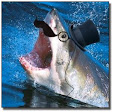 Life, like any good story or piece of music, is told in
movements. These movements all link
together to form harmony, dissonance, and ultimately the story that is our
civilization. Where we’ve been just
might tell us where we’re going, and if we ignore it we’ll put ourselves into
more trouble than we could imagine. Such
is the theme of Cloud Atlas, and such is a wondrous device to tell a story that
spans from 1850 to the far flung future, over the course of six separate yet
linked stories. Cloud Atlas is a
drama. It’s a love story. It’s a detective thriller, a comedy, and a
disturbing social commentary. Above all
else, Cloud Atlas is a story about hope brought by those who seem insignificant,
no matter what the future holds in store.
Life, like any good story or piece of music, is told in
movements. These movements all link
together to form harmony, dissonance, and ultimately the story that is our
civilization. Where we’ve been just
might tell us where we’re going, and if we ignore it we’ll put ourselves into
more trouble than we could imagine. Such
is the theme of Cloud Atlas, and such is a wondrous device to tell a story that
spans from 1850 to the far flung future, over the course of six separate yet
linked stories. Cloud Atlas is a
drama. It’s a love story. It’s a detective thriller, a comedy, and a
disturbing social commentary. Above all
else, Cloud Atlas is a story about hope brought by those who seem insignificant,
no matter what the future holds in store.
1.1
/2.1 / 3.1 / 4.1 / 5.1 / 6 / 5.2 / 4.2 / 3.2 / 2.2
/ 1.2
Confusing? To the
untrained eye, yes; simply because it’s a hard concept to explain. But in practice, it works perfectly as each
story is influenced by the other. What’s
more, little references and nods to things that happened before are also
present. The Pacific Journal of Adam Ewing is half read by the protagonist
in Letters from Zedelghem, whose partner in
letter writing is a key figure in Half Lives: The First Luisa Rey
Mystery which is a manuscript read during The Ghastly Ordeal of Timothy
Cavendish. That ghastly ordeal is
viewed during An Orison of Sonmi-451, which makes an appearance in Sloosha's
Crossin' an' Ev'rythin' After, which leads us to the rest of An Orison of
Sonmi-451, and so on. (To spoil all of
the connections would be the biggest disservice to the reader.)Make no mistake, this isn’t just an anthology that you can read at will; nor should you read each story in its entirety, in order. The book is laid out for a reason, and that reason is the story is so layered that it challenges the reader to make the connections and reinforce them throughout each story. Better still, each entry is written with a different framing device and writing style. We go from a journal written in older English to a first person recollection of one’s life written in a tribal future dialect, with each story evolving in linguistic style as well as narrative style.
With those flourishes in style though, we’re treated to the same
overarching themes of reincarnation and power struggles. A comet shaped birthmark heralds one soul’s
journey through three of our stories, with each story posing the same central
conflict: the underdog versus those in power.
Through each of these stories, dominance is possessed, challenged, and
both lost or gained on a whim. All the
while, the protagonists of these stories aren’t the stock vessel that an
audience member is expected to put themselves into. Instead, they are the little guy…the character
under the boot heel of whatever power may reign. They aren’t intrepid heroes or heroines who
are perfect and inspire us to be like them, they’re just normal people who
somehow got wrapped up in rather interesting circumstances. These characters aren’t wish fulfillment
paradigms that have all the money and all the power, they’re the David that
fights said Goliath when something is wrong.
Overall, the book is fantastic, with it being hard to even dare to pick a
favorite story. Imagine reading one
unified storyline through different eras, perspectives, and genres that somehow
made sense as a cohesive whole. Then
read Cloud Atlas and tell me how much different it is from your
expectations. It’s a book that demands
an audience, as well as demands to be taught in English Literature/Linguistics
classes alike.
Next Time: The Casual Vacancy by J.K.
Rowling

